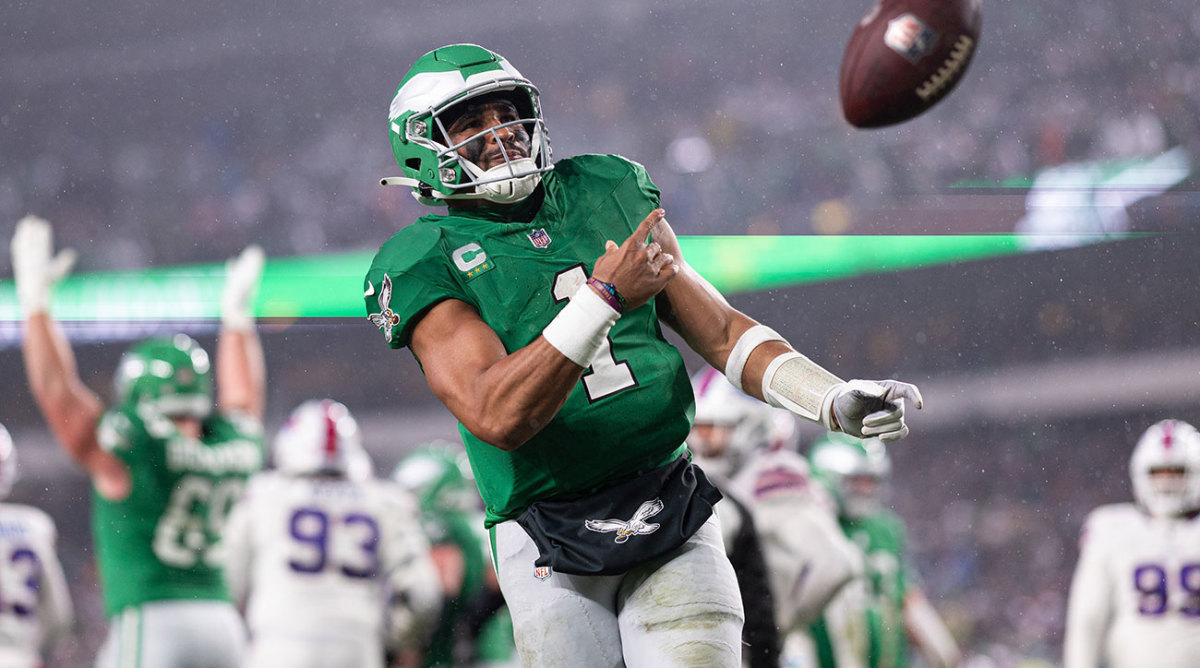The Eagles Are Capable of Destroying the Super Bowl Hangover Myth

Even the damn kicker is in on it. As Jake Elliott watched his 59-yard field goal bend through the uprights with the trajectory of a right-handed slicing golf shot, he held his fist in the air like a guitar player about to hit the encore’s money note. It was at that moment we should have all realized that Elliott wasn’t the least bit curious as to whether the ball was going to split the posts and send the Eagles to overtime despite it being just two yards short of his career long and in a driving rainstorm. He knew he was going to hit it with the same degree of confidence every other member of his organization knows they can do anything related to winning football games.
It was also at that moment Josh Allen and the Bills should have realized their initial overtime possession was merely a formality. Short of a walk-off touchdown, there was nothing they could do to stop the inevitable.

We could have hit fast-forward; we could have guessed it would be Jalen Hurts taking the ball on the beautiful keeper concept that the Eagles also ran for a touchdown in the Super Bowl against the Chiefs (the one Jason Kelce always seems to perfectly bury someone on at the end of his pull). We heard the Chicago Bulls’ famed entrance music playing before he took the field. We get it. Michael Jordan. Jalen Hurts. Scottie Pippen. A.J. Brown. All blended together. Some inexorable doom for anyone in the way. The Eagles, now 10–1, now winners of stunning back-to-back games (including the comeback in Kansas City last week) against the two best quarterbacks in the NFL, now officially undefeated in November, now standing on the throat of second-tier teams such as the Dolphins and Cowboys on their path to destruction, are as close to unstoppable as it gets in the NFL, with the 49ers coming to town next week.
However, this stretch of games is less about its conclusion—a rematch of the conference title game against the only other team in the NFL we might view with the same level of talent and depth—than it is about something far bigger. The great takeaway from the 2023 Eagles season is not what they are accomplishing but when. A Super Bowl loss used to be a kind of debilitating, short- to medium-term disease. Eight teams have made it back the year after losing. Ever. With 57 Super Bowls in the books. Three have won the game a year after losing. Ever. Not since the 1991 Bills or, before that, the ’72 Dolphins, have we seen a team such as Philadelphia that simply decided to eschew the curse altogether (we could argue that the insufferable ’72 Dolphins played in an era when we were unaware the curse even existed and thus didn’t really overcome much of anything in the cosmic sense).
Admit it. Kelce decided to come back. So did Fletcher Cox and Brandon Graham, who set a record Sunday for most games played as an Eagle. A few months ago it felt like The Office right after Michael Scott’s departure, nothing more than a celebrity-studded cash grab destined to get posterized on Rotten Tomatoes. They’d have to pay Jalen Hurts now. Someone (anyone?) would figure out how to stop the Tush Push. This offensive line would start to show its age. Losing both coordinators to head coaching jobs and replacing the architect of the defense with someone who wasn’t even coaching in Philadelphia in 2022 would cause a hiccup. There would be some pinhole opening through which the curse could emerge and then metastasize.
Instead, save for the strangest of losses to the Jets, the Eagles have only gotten better. Not statistically, necessarily (the 2022 Eagles through 12 weeks had a better EPA per play rating offensively, and only their rush defense has improved on a down-by-down basis from last year), but in the sense that almost all of these moments that have challenged the Eagles, that have metaphorically asked them whether the idea of losing a Super Bowl still lingers, the team has shed skin and emerged with some new strength.
Against Buffalo this week, it meant getting the absolute hardest slug to the gut the Bills had left. The Bills fully abandoned the strategic caution surrounding Josh Allen and set their quarterback loose like a brakeless semi truck (except for a decision many of us second-guessed in live time when they kneeled out the final 20 seconds before overtime). Allen was running with reckless abandon again, which has been the double-edged sword by which Buffalo had seen so much success in recent years (and, ultimately failure once Allen would inevitably get injured, which increased the pressure on former offensive coordinator Ken Dorsey to manufacture some type of non-QB run game that would produce the same effect).
Against the Chiefs a week ago, the Eagles’ offense was as limited as we’ve seen during the Nick Sirianni era. Hurts was constrained to a middling quick game to try to force some missed tackles, to will some first downs out of nothingness. When the Eagles got to within three in the third quarter against Kansas City, the broadcast team mused that it felt nothing like a three-point game; that the Chiefs had been so dominant. They couldn’t feel it. Not like the rest of us. Not like Elliott. Hurts. Sirianni. They didn’t yet understand this gravitational force that has now been cemented.
